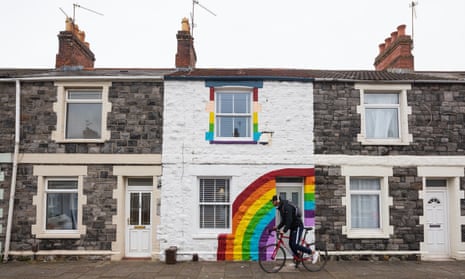As a jumpy person, for me much of this year has been deeply unpleasant. You have to understand that the sight of a mouse sends me screaming for help, and a fear of car accidents means I repeatedly text drivers “stay safe”; an action that, though intended in the kindest possible way, is counterproductive. Then along comes Covid-19, this horror movie-style plague that travels through the air killing hundreds of thousands of people around the world. I find myself, perfectly healthy and thankfully not in an at-risk category, sitting very still in my childhood bedroom and mentally catastrophising well into the small hours. I’m one of the lucky ones, able to do that and not expected to go out and work. My full-time job, it seems, has been fear.
The gradual reopening has not given me any peace. Rather, it has amped up my anxiety. Families wander around packed beaches unmasked, old ladies chat on the street, leaning in to better hear their friends’ news, young people in velour tank tops crowd around tables, drinking and laughing like it’s 1998 again. Aren’t they all frightened too? The thought occurs to me that perhaps they are frightened, and that is what is causing their defiance.
Fear can make us paralysed or it can make us reckless. This fear is legitimate, of course; any one of us could sicken and die from coronavirus, or give it to others who are even more likely to sicken and die than we are. However, as lockdown eases and we understand viscerally that things will not go back to how they were, whether we like it or not, I suddenly feel like something has cracked the window I’ve been stuck behind, and there’s a sweet and gentle breeze blowing through. There is a new reality now, an opportunity to pair that fear with something more useful. I believe I know what that something is. I wonder, would you scream at the screen if I told you that that something is hope?
The world is in chaos, divisions are multiplying daily, and I’m seriously considering … hope? Here’s how I’ve got there: we are living in fear of this virus, but we are also seeing how much we need each other. We fight coronavirus collectively or we lose. That’s where hope comes in, because when you think something is impossible, you can’t hope for it, and if you think something is certain, then you expect it. You see, you can only hope for things that you’re not sure about.
Hope is more than a shallow optimism. It’s not a saccharine wish or a political slogan. Hope can come only from deep within because it’s impossible to take hopeful actions without courage. Perhaps now, as climate chaos looks set to engulf us all, transformation is our only option. I see this hope in the Black Lives Matter movement and the clarity of its demands. The anger expressed by African Americans and those supporting them is an effective message of hope – because if they didn’t harbour some hope that they could force change, why would they even try?
Hope is not simply positive thinking. It’s not the naive instinct of the privileged that says things will surely just get better. Hope is action and, like fighting a virus, it works much better when we do it together. A safe, just world for us and our children is far from certain right now, but many of us are feeling this strange duo bubbling up inside; fear and hope together.
In realising anew that we are all interconnected, we have understood how our struggles are too. The fights against climate chaos and white supremacy and coronavirus are all linked, and the solutions are too. In the face of any of these formidable foes, I can understand despair, but I’m learning from and grateful to people who instead live daily in hope. I’m feeling and acting on hope at the same time as being afraid, and it’s proving helpful.
You’ll be glad to hear – at least my parents were – that I’ve left my bedroom. I’m back out in the world, cautiously, hopefully. Like fear, hope is not something that you can make yourself feel. Unbidden, it finds you. But unlike fear, which rises easily, hope is quieter, and far too easy to talk yourself out of. Don’t do that – instead welcome that small breeze you’re feeling and push the window up a little more. Eventually it just might pick up into a mighty wind.
